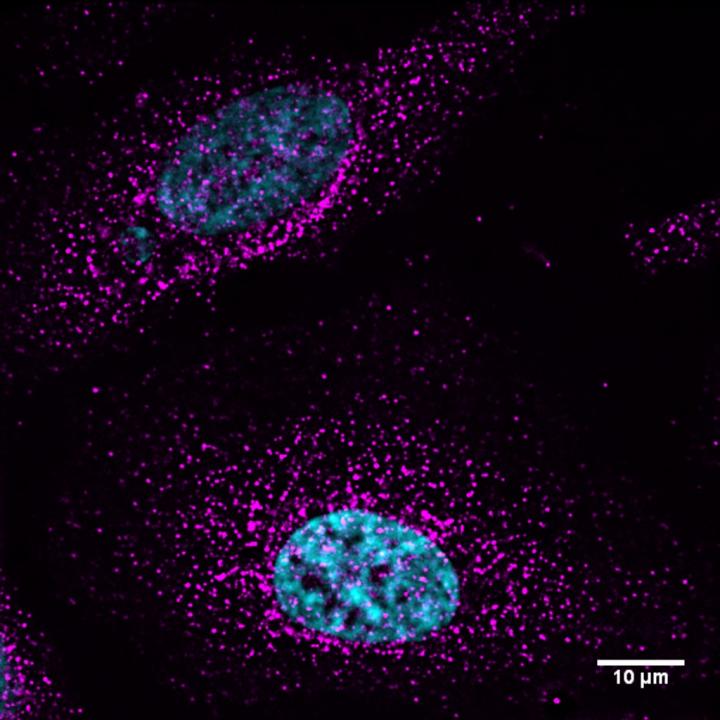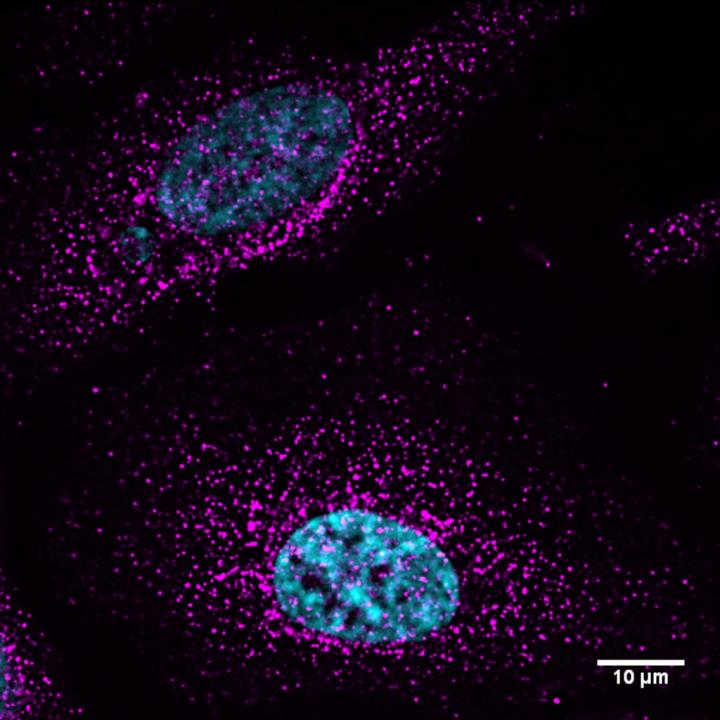
Credit: University of Kent
Scientists led by Dr Chris Toseland of the University's School of Biosciences studied a protein called Myosin VI, a molecular motor which acts as a courier to transport other proteins within our cells. Myosin VI is highly present in many cancers yet the role is unclear. Dr Toseland's study to understand the role of Myosin VI found it was critical in the production of specific genes which are linked to cell growth and tumour development. This is particularly relevant to breast, ovarian, prostate and colon cancer.
Approximately 70% of all breast cancer is oestrogen sensitive and the results of this study may identify new treatment targets for patients with the disease. As a result of his findings, Dr Toseland is now inviting patients in the NHS to take part in further research. This will investigate how myosins are targeted to specific genes, and determine how they are themselves regulated, enhancing scientists understanding of their function during breast cancer.
Understanding the role of Myosin VI in the disease may also highlight further diagnostic clues for the disease. This would potentially allow for a better choice of treatment to be administered.
Dr Toseland's findings are presented in an article entitled: NDP52 activates nuclear myosin VI to enhance RNA polymerase II transcription, published in the journal Nature Communications.
###
For further information or interview requests contact Sandy Fleming at the University of Kent Press Office. Tel: 01227-823581/01634-888879 Email: [email protected]
News releases can also be found at http://www.kent.ac.uk/news
University of Kent on Twitter: http://twitter.com/UniKent
Notes to Editors
https://www.nature.com/articles/s41467-017-02050-w Nuclear Myosin VI – a therapeutic target in oestrogen receptor positive breast cancer? aims to recruit 100 patients with oestrogen receptor positive breast cancer and 20 patients who do not have breast cancer as a comparison group. The University of Kent will provide the initial funding of the study and applications for funding have been made to major UK Breast Cancer Charities.
Transfer of the genetic code (gene expression) into cellular proteins is one of the most fundamental processes in living cells and is orchestrated by protein-based molecular machines. Cells have evolved elaborate regulation mechanisms to control these molecular machines. It is a breakdown in this regulation that leads to diseases such as cancer.
Established in 1965, the University of Kent – the UK's European university – now has almost 20,000 students across campuses or study centres at Canterbury, Medway, Tonbridge, Brussels, Paris, Athens and Rome.
It has been ranked 22nd in the Guardian University Guide 2018 and 25th in the Complete University Guide 2018, and in June 2017 was awarded a gold rating, the highest, in the UK Government's Teaching Excellence Framework (TEF).
In the Times Higher Education (THE) World University Rankings 2015-16, it is in the top 10% of the world's leading universities for international outlook and 66th in its table of the most international universities in the world. The THE also ranked the University as 20th in its 'Table of Tables' 2016.
Kent is ranked 17th in the UK for research intensity (REF 2014). It has world-leading research in all subjects and 97% of its research is deemed by the REF to be of international quality.
In the National Student Survey 2016, Kent achieved the fourth highest score for overall student satisfaction, out of all publicly funded, multi-faculty universities.
Along with the universities of East Anglia and Essex, Kent is a member of the Eastern Arc Research Consortium .
The University is worth £0.7 billion to the economy of the south east and supports more than 7,800 jobs in the region. Student off-campus spend contributes £293.3m and 2,532 full-time-equivalent jobs to those totals.
Kent has received two Queen's Anniversary prizes for Higher and Further Education.
Media Contact
S.Fleming
[email protected]
44-012-278-23581
@UniKent
http://www.kent.ac.uk
Related Journal Article
http://dx.doi.org/10.1038/s41467-017-02050-w





